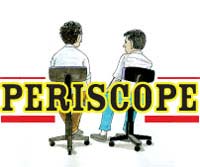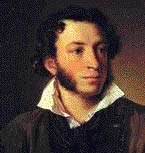|

With Pushkin
In a snowy evening:
This comes to pass in the wee hours of January 29, 1837, a day after
Pushkin’s death – I’m all alone in this vast land of melting snow, where
everything seems to merge into oblivion. Lying on my back I gaze at the
starry sky.
My name is Lev Aleksandrovich. Lev, which means lion in Russian, is
also called Leo – just as Bill is Williams in English. But for Pushkin I
was always the ‘little son’. I am myself a lad, born into this hectic
world exactly a decade ago, left to loneliness while elders attend to
the business at hand: Pushkin’s funeral.
They take in Alexander Pushkin – Alexander Sergeyevich Pushkin, to be
exact – to be the greatest Russian writer ever born. To me all the same,
he was still a dear uncle who had a lot of stories to share with me.
Involuntarily I recall what he used to tell me during our stargazing
hours.
I’m looking forward to seeing two time travellers: Anna Akhmatova and
Boris Pasternak, both mainstream Russian writers in a later period. They
are traveling all the way backwards, to pay last honours to a lifeless
corpse.
And then I would realize there’s more to this man, than I could ever
know and think of.
* * *
|

Pushkin |
“No one in my large family wrote poetry. But I remember they talk of
an aunt of my grandfather called Anna Burnina. She is the first Russian
poetess.”
Anna Akhmatova broached the conversation; both Boris and I checked
the embers. The samovar, a metal urn for making tea, is close by for
easy reach.
“Well, in my case I was born into a family with a lot of
artiste-acquaintances. My father Leonid Pasternak was a professor of art
and sculpture, and my mother a concert pianist. Leo Tolstoy used to
frequent our home. So did many others.” Boris mused as if speaking to
himself.
I study their faces. Noticing my curious silence, Boris added:
“We should tell this boy who his uncle is, shouldn’t we Anna?”
My uncle! Yes he was great. His death seems so strange to me. He was
injured following a duel he had with his brother in law Georges d’Anthes.
And two days later, he passed on. Georges had a scandalous affair with
Pushkin’s wife. Not only that, but my uncle was humiliated by the Tsar’s
ruling too. I have this weird feeling that the government was scared of
my uncle.
“Your uncle, Alexander Pushkin, is the founder of modern Russian
literature.” Boris’ voice pulled me out of thoughts.
“And he is the greatest Russian poet ever,” Anna said in a low tone,
“he composed his first poem at 15.”
“He wrote a novel too. Eugene Onegin.” Boris said.
“That was in verse too.” Anna sauted the fact.
The time travelers speak in fluent yet heavily-accented English –
they have chosen to speak in English despite the fact that I’m a Russian
too. Their English sounds more modern than the one I’m familiar with.
Fluent speakers of English are a rarity in our nation. Russians are a
lucky lot not to have suffered being a colony.
“There are other poets too in this era. Why, this one in particular?”
But then thoughts crowded in my mind. Everyone can be a poet, having
written down what they feel. But most of them are just cerebral, as my
father once said in Pushkin’s presence. This recollection makes it
easier to understand what Boris says.
“Pushkin is a pioneer. You can call him a trendsetter.”
“What I love in him is that he could use the local dialect fluently.
He could get closer to the common peasant. Thankfully our culture had
only a little of foreign influence.” Anna explained.
“Exactly. I think that explains him a lot. He was always rooted to
the soil. That may be why Bolsheviks saw him as an opponent to bourgeois
literature. But unfortunately it took a worse turn.” Boris said.
Anyone against the tide will have to face the music. I was old enough
to understand that reality. At least that’s what I understand with my
uncle’s premature death.
“He was interested more in being radical reformist type. He was using
all his genres, poetry, novel and playwriting, to let out his
frustration on the social order.” Boris carried on.
“But did it work?” I asked.
“Well, not wonders though. He could not change the order, and
apparently you cannot do it overnight. But he caused some uproar…”
“He had the capacity, Boris. I think Pushkin is the Russian
Shakespeare. He had a rich vocabulary and used it in a very sensitive
style. That established the modern Russian literature for us. And yes,
he is our father. He is the father of Russian literature.” Anna said.
“True. His life was so brief, but his influence is larger than life.
Lyric poetry, narrative poetry, novel, short story drama and critical
essays, he set a new trend in all this. That formed the style of Ivan
Turgenev, Ivan Goncharov and Leo Tolstoy and even Nikolai Gogol.”
Drop by drop tears rolled down my cheeks as I listened to them.
Pushkin, my dear uncle, that snowy evening creeps in inch by inch. I
remember you held me tight to your chest and I was listening to your
poem. And now I wonder if you really meant it.
When I look at a solitary oak
I think: the patriarch of the woods.
It will outlive my forgotten age
As it outlived that of my
Grandfathers’.
If I caress a young child,
Immediately I think: farewell!
I will yield my place to you,
For I must fade while your flower
Blooms. [trans: G R Ledger]
- Sachitra and Samodh |



